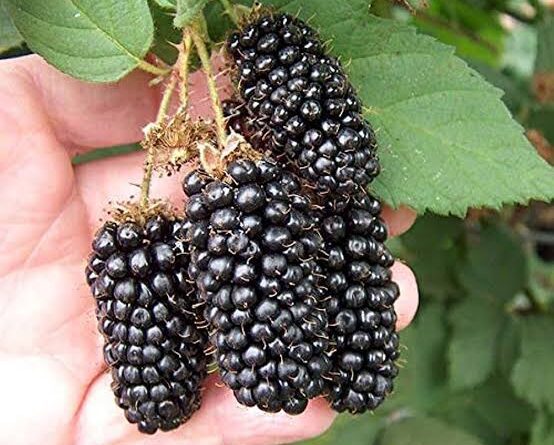25 Medicinal Health Benefits Of Blackberry (Rubus fruticosus)
The blackberry, scientifically known as Rubus fruticosus, is a delectable and nutrient-rich fruit with a fascinating history. Native to Europe, the blackberry belongs to the Rosaceae family, which includes other fruits like strawberries, raspberries, and apples.
Throughout history, blackberries have played a significant role in culinary traditions, folklore, and even medicine. In this article, we will delve into the medicinal health benefits of blackberries, exploring their botanical description, nutritional content, and therapeutic applications.
The Botanical Description of Blackberry
1. Plant Structure: Blackberry bushes are perennial plants that typically grow between 3 to 6 feet in height. They feature long, thorny canes that bear leaves and fruit. The leaves are palmately compound, usually with five serrated leaflets, and they are dark green in color.
2. Flowers: Blackberry bushes produce delicate white or pink flowers with five petals. These flowers are usually found in clusters and bloom during the late spring to early summer.
3. Fruit: The most recognizable part of the blackberry plant is its fruit. Blackberries are aggregate fruits composed of multiple small drupelets. Each drupelet contains a seed, and when ripe, they form a cluster that appears as a dark purple to black, juicy, and sweet berry.
4. Thorns: One distinguishing feature of blackberry bushes is their thorns, which can be quite sharp. These thorns help protect the plant from herbivores.
The Geographic Distribution of Blackberry
1. Native Range: Blackberries (Rubus fruticosus) are native to Europe and parts of Asia. They thrive in regions with temperate climates, characterized by distinct seasons.
2. Global Distribution: Over time, blackberries have been introduced and naturalized in various parts of the world. Today, you can find them growing wild or cultivated in North America, South America, Australia, and New Zealand. They are particularly well-suited to regions with mild winters and plenty of sunlight.
3. Habitat: Blackberries often grow in a variety of habitats, including woodlands, hedgerows, meadows, and along roadsides. They are adaptable and can tolerate a range of soil types, from sandy to loamy.
The Chemical Composition of Blackberry
1. Antioxidants: Blackberries are rich in antioxidants such as anthocyanins, quercetin, and ellagic acid. These compounds help protect cells from oxidative stress and reduce the risk of chronic diseases.
2. Vitamins and Minerals: Blackberries are a good source of vitamins C and K, as well as essential minerals like manganese and potassium. Vitamin C supports the immune system, while vitamin K is vital for blood clotting.
3. Dietary Fiber: They are also high in dietary fiber, including both soluble and insoluble fiber. This fiber content aids in digestion, promotes a feeling of fullness, and helps regulate blood sugar levels.
4. Polyphenols: Blackberries contain various polyphenols, including tannins and flavonoids, which have anti-inflammatory properties and may contribute to heart health.
5. Organic Acids: Organic acids like citric acid and malic acid give blackberries their characteristic tartness. These acids can play a role in maintaining proper pH levels in the body.
The Harvesting and Processing of Blackberry
1. Harvesting: Blackberries are typically harvested during the late summer to early autumn when they are ripe and at their peak flavor. Harvesting is done by gently picking the berries from the bushes to avoid damaging the fruit.
2. Processing: After harvesting, blackberries can be processed in various ways. They are often frozen, canned, or used to make products like jams, jellies, and juices. Freezing helps preserve their freshness, while canning and processing into jams extend their shelf life.
3. Culinary Uses: Blackberries are versatile in the kitchen and can be used in a wide range of recipes, including pies, cobblers, smoothies, and salads. Their sweet-tart flavor adds depth to both sweet and savory dishes.
4. Medicinal Uses: Blackberries have been used in traditional medicine for their potential health benefits. They can be consumed fresh or in various forms like herbal teas and supplements to support overall health and well-being.
Read Also: Maine Coon Cat Breed (Felis catus): Description and Complete Care Guide
The Medicinal Health Benefits Of Blackberry (Rubus fruticosus)

Blackberries are not just delicious; they also offer a plethora of medicinal health benefits. Let’s explore 25 of these benefits:
1. Antioxidant Power: Blackberries are rich in antioxidants, which combat free radicals and reduce oxidative stress.
2. Immune Boost: The high vitamin C content in blackberries supports a robust immune system.
3. Heart Health: Blackberries may lower the risk of heart disease by reducing cholesterol levels and improving blood vessel function.
4. Digestive Aid: The dietary fiber in blackberries promotes healthy digestion and prevents constipation.
5. Anti-Inflammatory: Blackberries contain polyphenols that help reduce inflammation in the body.
6. Skin Health: Antioxidants in blackberries can contribute to youthful skin by fighting signs of aging.
7. Weight Management: The fiber content helps control appetite and aids in weight management.
8. Diabetes Management: Blackberries have a low glycemic index and may help regulate blood sugar levels.
9. Cognitive Function: Antioxidants may support brain health and cognitive function.
10. Bone Health: Blackberries contain vitamin K, which is essential for bone health.
11. Eye Health: Antioxidants like lutein and zeaxanthin in blackberries support eye health.
12. Anti-Cancer Properties: Some studies suggest that blackberries may help inhibit the growth of certain cancer cells.
13. Oral Health: Blackberries’ antimicrobial properties can contribute to oral hygiene.
14. Respiratory Health: Blackberries may help alleviate symptoms of respiratory conditions.
15. Blood Pressure: Potassium in blackberries can help lower blood pressure.
16. Anti-Aging: Blackberries’ antioxidants may slow down the aging process.
17. Wound Healing: Blackberries can help in wound healing due to their vitamin C content.
18. Urinary Tract Health: Blackberries may reduce the risk of urinary tract infections.
19. Anemia Prevention: The iron content in blackberries helps prevent anemia.
20. Allergy Relief: Quercetin in blackberries may alleviate allergy symptoms.
21. Anti-Arthritic: Blackberries’ anti-inflammatory properties can help manage arthritis.
22. Liver Health: Antioxidants may support liver health and detoxification.
23. Muscle Recovery: Blackberries’ nutrients aid in muscle recovery after exercise.
24. Stress Reduction: Blackberries may have a calming effect on the nervous system.
25. Gastrointestinal Health: They can help soothe gastrointestinal discomfort and inflammation.
The Methods of Usage to Achieve the Provided Health Benefits Of Blackberry (Rubus fruticosus)
To harness the health benefits of blackberries, consider these methods of usage:
1. Fresh Consumption: Enjoy blackberries as a healthy snack or add them to salads, cereals, or yogurt.
2. Smoothies: Blend blackberries into smoothies for a refreshing and nutritious drink.
3. Jams and Preserves: Make homemade jams or preserves to enjoy blackberries year-round.
4. Herbal Tea: Create blackberry leaf tea for its potential health benefits.
5. Supplements: Blackberry supplements, such as capsules or powders, are available for concentrated benefits.
6. Topical Applications: Apply crushed blackberries or blackberry-infused products to the skin for skincare benefits.
The Side Effects Of Using Blackberry Medicinal Plant
While blackberries offer numerous health benefits, it’s essential to be aware of potential side effects:
1. Allergic Reactions: Some individuals may be allergic to blackberries, leading to itching, swelling, or rashes.
2. Gastrointestinal Issues: Consuming excessive blackberries may cause digestive discomfort, such as diarrhea or stomach cramps, due to their fiber content.
3. Interaction with Medications: Blackberries may interact with certain medications; consult a healthcare professional if you have concerns.
4. Oxalate Content: Blackberries contain oxalates, which can contribute to kidney stone formation in susceptible individuals.
5. Staining: The dark pigments in blackberries may temporarily stain teeth and clothing.
Read Also: 21 Medicinal Health Benefits Of Ligusticum striatum (Chuan Xiong)
The Scientific Research and Studies of Blackberry (Rubus fruticosus)

1. Antioxidant Properties: Numerous studies have explored blackberries’ antioxidant content, indicating their potential in preventing oxidative stress-related diseases.
2. Anti-Inflammatory Effects: Scientific research suggests that compounds in blackberries exhibit anti-inflammatory properties, which can benefit various inflammatory conditions.
3. Anti-Cancer Potential: Studies have investigated blackberries’ role in cancer prevention, focusing on their ability to inhibit the growth of cancer cells.
4. Cardiovascular Health: Research indicates that blackberries may contribute to cardiovascular health by lowering cholesterol levels and improving blood vessel function.
5. Neuroprotective Effects: Scientific studies have explored how blackberries’ antioxidants might protect brain cells, potentially aiding in neurodegenerative disease prevention.
6. Diabetes Management: Research has delved into the impact of blackberries on blood sugar levels, indicating their potential in diabetes management.
7. Gut Health: Studies suggest that the fiber in blackberries supports gut health, promoting a balanced and diverse gut microbiota.
8. Anti-Bacterial Properties: Research has examined blackberries’ antibacterial properties, indicating their effectiveness against certain bacteria.
9. Eye Health: Scientific studies have focused on blackberries’ impact on eye health, particularly in preventing age-related macular degeneration.
10. Wound Healing: Research indicates that blackberries’ vitamin C content contributes to wound healing by promoting collagen synthesis.
11. Anti-Aging Effects: Studies exploring blackberries’ antioxidants have indicated their role in slowing down the aging process and promoting overall longevity.
12. Liver Protection: Scientific research has investigated how blackberries might protect the liver from damage, particularly in cases of alcohol-induced liver injury.
13. Respiratory Health: Studies have explored the potential of blackberries in managing respiratory conditions, indicating their anti-inflammatory effects on the respiratory system.
14. Muscle Recovery: Research suggests that the nutrients in blackberries aid in muscle recovery post-exercise, promoting faster healing.
15. Bone Health: Scientific studies have examined the impact of blackberries on bone density, indicating a positive correlation between blackberry consumption and bone health.
The Safety Precautions and Recommendations In Using Blackberry (Rubus fruticosus) Medicinal Plant
1. Allergy Check: Individuals with known allergies to berries should avoid blackberries and related products to prevent allergic reactions.
2. Moderation is Key: While blackberries offer numerous health benefits, excessive consumption should be avoided to prevent digestive issues such as diarrhea.
3. Interaction with Medications: If you are on medication, consult a healthcare provider before incorporating blackberries into your diet, as they might interact with certain drugs.
4. Kidney Stones: Individuals prone to kidney stones should be cautious due to blackberries’ oxalate content, which can contribute to stone formation.
5. Dental Care: Blackberries’ dark pigments can temporarily stain teeth, so it’s advisable to rinse your mouth after consuming them to prevent staining.
FAQs About Blackberry (Rubus fruticosus) Medicinal Plant
1. Are blackberries safe for everyone to consume?
Yes, blackberries are generally safe for most people. However, individuals with berry allergies should avoid them.
2. Can blackberries help with diabetes management?
Research suggests that blackberries may help regulate blood sugar levels, making them potentially beneficial for diabetes management.
3. How can blackberries be used topically for skin benefits?
Crushed blackberries or blackberry-infused products can be applied to the skin to harness their antioxidant properties, promoting skin health.
4. Are there any known drug interactions with blackberries?
While rare, blackberries might interact with certain medications. Consult a healthcare provider if you are concerned about potential interactions.
5. Can blackberries be consumed during pregnancy?
Pregnant individuals can consume blackberries in moderation as they are a good source of essential nutrients. However, it’s best to consult a healthcare provider.
6. Do blackberries have any impact on eye health?
Yes, blackberries contain antioxidants that support eye health and may help prevent age-related macular degeneration.
7. Are there specific recipes that maximize the health benefits of blackberries?
Recipes such as smoothies, salads, and jams retain most of blackberries’ nutrients, making them delicious and nutritious options.
8. Is it possible to consume blackberries if I have kidney stones?
Individuals prone to kidney stones should consume blackberries cautiously due to their oxalate content, which can contribute to stone formation.
9. Can blackberries be used in herbal remedies?
Yes, blackberries’ leaves can be used to make herbal teas, offering potential health benefits.
10. Are there any age restrictions for consuming blackberries?
Blackberries are suitable for people of all ages, provided there are no allergies or specific health restrictions.
11. Can blackberries help with weight management?
Yes, the dietary fiber in blackberries can promote a feeling of fullness, aiding in weight management by controlling appetite.
12. How can I incorporate blackberries into my diet?
You can enjoy blackberries fresh as a snack, add them to cereals, yogurt, or blend them into smoothies. They also make excellent additions to desserts and salads.
13. Are there any known side effects of topical blackberry applications for the skin?
Topical applications of blackberries are generally safe but perform a patch test first to ensure you do not have any adverse reactions.
14. Can blackberries be consumed as a preventive measure against cancer?
While blackberries contain compounds with potential anti-cancer properties, they should not be considered a sole preventive measure. A balanced diet and lifestyle factors play a significant role in cancer prevention.
15. Are there any specific blackberry varieties with enhanced health benefits?
Different blackberry varieties have similar health benefits, but some may have slightly different flavors or textures. The overall health benefits are consistent across most varieties.
16. How do blackberries compare nutritionally to other berries?
Blackberries are nutritionally similar to other berries like blueberries and raspberries, with slight variations in vitamin and mineral content.
17. Can blackberries be safely consumed during breastfeeding?
Blackberries are generally safe to consume while breastfeeding and can provide essential nutrients. However, individual tolerance may vary.
18. Are there any known contraindications for blackberry consumption?
While blackberries are safe for most people, individuals with specific medical conditions or allergies should exercise caution and consult a healthcare provider.
19. How do I store blackberries to maximize their freshness?
Store blackberries in the refrigerator and use them within a few days to maintain their freshness. Avoid washing them until you are ready to consume or use them.
20. Can blackberry supplements replace fresh blackberries for their health benefits?
While supplements offer concentrated benefits, it’s generally recommended to incorporate a variety of fresh fruits, including blackberries, into your diet for overall health.
21. Do blackberries have any impact on blood pressure?
The potassium content in blackberries can help lower blood pressure and contribute to overall cardiovascular health.
22. Can blackberries be included in a low-carb diet?
Yes, blackberries can be consumed in moderation on a low-carb diet due to their relatively low carbohydrate content.
23. How can I safely introduce blackberries into my child’s diet?
Introduce blackberries gradually, starting with small portions to monitor for any adverse reactions, and ensure they are old enough to consume solid foods.
24. Are there any recommended serving sizes for blackberries to reap their health benefits?
A reasonable serving size is around one cup of fresh blackberries daily to enjoy their nutritional advantages without overconsumption.
Read Also: The Healing Properties of the Aloe Vera Plant









